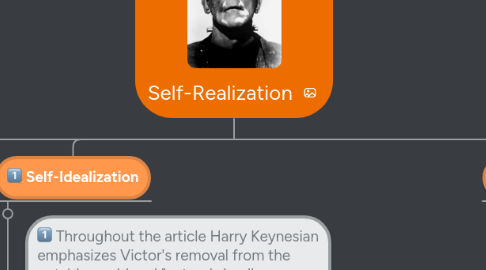
1. Introduction
1.1. Harry Keyishian starts his analysis by questioning the reader's traditional view of Frankenstein as a classic monster character and prepares the reader to accept Frankenstein's monster rather than a literary character as a reflection of societies' journey through self-realization.
1.2. Self-idealization is clearly emphasized in the early chapters of Frankenstein and is the driving force that moves Victor Frankenstein to commit such defilements against nature.
1.3. The search for glory is a downward spiral in which Victor found himself in as he further isolated himself from the only sources of human interaction in his life.
1.4. Pathological vindictiveness is explored as Frankenstein's monster navigates through the many turmoils of the human world having come across maslow's hierchy of needs and denied life's most basic experiences has stripped him of what little humanity he had within him.
1.5. The human existence is plagued by a core desire to gain a sense of self-fulfillment which takes the person on a futile journey in search of a higher status resulting in the acceptance of one's human existence.
2. Conclusion
2.1. The inner force found within humans to achieve a higher status often leads down a path of perdition and an insatiable hunger for revenge that will only be quenched by the realization of the frailty and beauty of the human spirit.
2.2. self-idealization, search for glory, and pathological vindictiveness.
2.3. Throughout the passage Harry analyzes the three stages that Victor and his monster experience as they deal with human core emotions such as the quest for self-idealization which brings on the search for glory and entices pathological vindictiveness ultimately piecing together the human journey and acceptance of one’s flawed existence.
3. Self-Idealization
3.1. Throughout the article Harry Keynesian emphasizes Victor's removal from the outside world and "nature's healing influences".
3.1.1. Horney states "In a solitary chamber, or rather cell, at the top of the house, and separated from all the other apartments by a gallery and staircases"
3.1.2. "I kept my workshop of filthy creation . . . It was a most beautiful season; never did the fields bestow a more plentiful harvest or the vines yield a more luxuriant vintage"
3.1.3. "but my eyes were insensible to the charms of nature"
3.2. Victor's drive to attain perfection drove him to obsess over attaining a "God-like power" that would beheld over his creature
3.2.1. In the process," she writes, "he endows himself with unlimited powers and with exalted faculties"
3.2.2. "he becomes a hero, a genius, a supreme lover, a saint, a god"
3.2.3. "can be like a demoniacal obsession, almost like a monster swallowing up the individual who has created it"
3.3. Ultimately Victor's pursuit stripped him of any human qualities that he possessed
3.3.1. "The drive to attain glory, Horney points out, can override "the checks which usually prevent our imagination from detaching itself from actuality."
3.3.2. As he grows more involved in actualizing the idealized figure of his imagination, this individual loses contact with all that makes human contentment possible"
3.3.3. "He loses his capacity for living in the moment. (p. 35)"
4. Search for Glory
4.1. In the article Harry states that in order to find what Victor was looking for he would isolate himself to achieve his goal of creating new life.
4.1.1. "Victor cuts himself off from all the forces that might connect him with ordinary existence"
4.1.2. "When he at last assembles the creature and gives it life, however, he is repelled by the actual product, which is "a miserable monster,"
4.1.3. "reality keeps interfering with the flight to glory, the individual grows to hate it, and to hate himself."
4.2. Because Victor saw the monster as grotesque the monster never found the true meaning of being human.
4.2.1. "His creator fled from him in horror."
4.2.2. "In hiding, he observes a human family's daily round of life"
4.2.3. "Nature has done me a grievous wrong in denying me that beauty of form which wins human love."
4.3. Both victor and the monster were looking for something, whether to find a peace of humanity or higher knowledge both ended up in a disasters situation do to their search for glory.
4.3.1. Rejected by the family he identified with, from whom he hoped to gain acceptance and friendship, he is overcome by "rage and revenge"
4.3.2. "I became convinced that I was in reality the monster"
4.3.3. "It is true, we shall be monsters, cut off from all the world"
5. Pathological Vindictiveness
5.1. Though out the article it can be inferred that both Victor and the monster were looking for revenge which is consuming both their beings and will solve nether of their problems.
5.1.1. "Victor cuts himself off from all the forces that might connect him with ordinary existence."
5.1.2. "He loses his capacity for living in the moment."
5.1.3. "Vindictiveness will not, of course, solve the monster's underlying problem, which is the need for companionship. "
5.2. Victor wanting to get ride of the creature he made became mad wanting to destroy the very thing that cursed his hands.
5.2.1. "brings to life and then attempts to destroy his creature."
5.2.2. "Victor destroys the female just when he is at the point of bestowing life upon her. "
5.2.3. "Victor's death, to express his regrets and announce his intention to destroy himself"
5.3. The monster who just wanted to be part of the world but would always be an out cast would seek out love that he could never have making him ill longing for the love he would never receive.
5.3.1. "Nature has done me a grievous wrong in denying me that beauty of form which wins human love."
5.3.2. "the creature has come to understand the nature of human love, but has discovered that he never can share it"
5.3.3. "comes to give up all hope of being loved"
